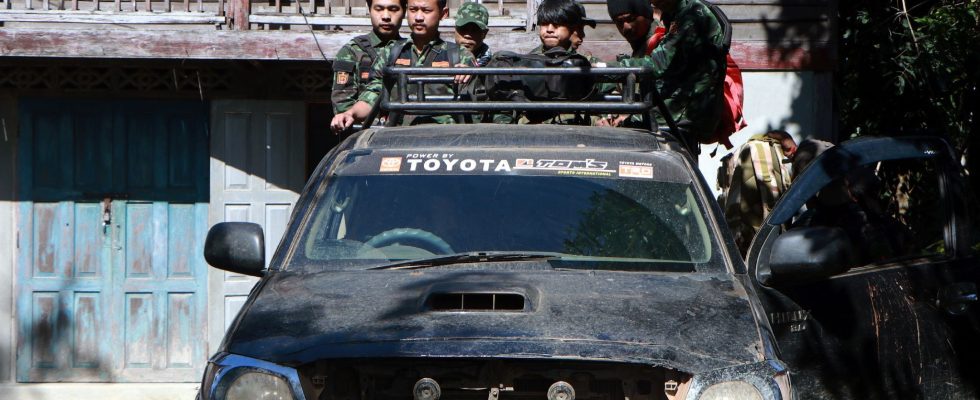The video footage, shot by the Karenni rebels, is previously unpublished. A few meters from the gate of Loikaw University, capital of Kayah State, their commander harangues the soldiers of the Burmese army trapped inside the campus, ordering them to surrender. About thirty men, the survivors of their battalion, emerge haggard and staggering. Several are seriously injured. The following days, the Karenni will continue their offensive with the objective of taking the city, regional headquarters of the command of the Tatmadaw (the Burmese armed forces).
Their attack comes shortly after another offensive carried out more than 700 kilometers in the northeast of Shan State, along the Chinese border, by the Brotherhood Alliance, bringing together three ethnic groups (Arakanese, Kokang and Palaung ). Operation “1027”, so named because it began on October 27, was as spectacular as it was unexpected. The Alliance claims the capture of 200 Burmese positions, several towns and numerous border posts. The fighting has spread to neighboring Kachins and into the ethnic states of the West (Arakan, Chin State).
While the civil war has lasted for almost three years – and the military coup of February 1, 2021 – the observation is clear: the fronts have multiplied in recent weeks. Why now ? First, China probably played a role. The powerful northern neighbor, for whom Burma represents major economic and strategic interests – direct access to the Indian Ocean – has long maintained a double game by supplying arms to both camps at the same time, the Burmese junta and the ethnic minorities, including the three Alliance groups.
For several months, Beijing has been leading a campaign to dismantle Chinese criminal networks that use Burmese territory for vast and profitable online fraud operations. The Chinese authorities, unhappy with the lack of cooperation from the Burmese junta, have therefore delegated part of this fight against crime to allied ethnic minorities. “Yes,” admits Tar Pan La, spokesperson for the Palaung guerrillas, “we regularly meet with the Chinese, who asked us to cooperate with them. We told them that we would do our best, because we cannot tolerate these criminal activities within our communities. But, initially, the “1027” operation that we have been preparing for two years has nothing to do with that.”
Better coordination between opposition movements
“China may have given the green light to Operation ‘1027’”, analyzes the International Institute for Strategic Studies, which adds that the actors in the conflict in Burma are not “so submissive as to act on an order of China”, but that they know how to “seize opportunities”. Feeling betrayed, the Burmese generals organized a “spontaneous” demonstration of their civilian and Buddhist supporters in front of the Chinese embassy in Yangon (Rangoon). But the junta quickly reaffirmed its “strong and friendly ties” with Beijing.
Second explanation for this multiple offensive, better coordination between armed opposition movements, which have strengthened – ethnic organizations – or developed by the hundreds – civilian groups – since the 2021 putsch. And this, despite deep differences. Some are fighting for a form of local autonomy, others for the establishment of a federal state, still others for a return to a democratic regime… not to mention territorial rivalries.
As a result, the Tatmadaw, faced with significant human, territorial and material losses, is facing one of the most delicate situations it has experienced since independence in 1948. The country is even “threatened with breakup” , according to interim president Myint Swe. The Burmese army, however, remains master of the air, thanks to Russian and Chinese combat planes; it also has well-trained infantry units and strong stocks of heavy weapons and ammunition. Although the morale of the soldiers is said to be at its lowest, desertions remain limited to this day. “They are under strong pressure, because if they desert they lose their salary and can no longer feed their family,” specifies Tar Pan La. For the moment, whatever their disagreements, the armed movements seem to have an objective common: put an end to the junta. Then it will be time to take notice.
.
